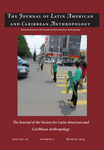This essay considers the terrain of incarceration and nationalism on the borderlands in rapprochement with the discursive practices of migrants caught within its confines. Specifically, the essay explores the religious speech acts revealed in letters from migrant detention that can be read as a subversion of hegemonic fictions of the border and the systems of belief that uphold them. Sociologists, anthropologists, historians, and political theorists have carefully documented and researched the U.S. migrant detention system. Studies have focused on family separation and detention of minors while others have detailed the histories of Customs and Border Patrol and the expansion of Immigration and Customs Enforcement, imbricated with constructions of racialized notions of security, borders, and nationhood. Fewer studies have treated the religious dimensions that emerge in unique formations on the
borderlands. Within this literature, some studies have provided a sociological focus on the shifts in religious landscapes of migration to the United States and diaspora while others have emphasized religiously motivated activism around issues of immigration. This paper bridges the analytical gap through foregrounding the voices of detained migrants as they are related through a collection of letters, written from the Otay Mesa Detention Center in southern San Diego County between 2018 and 2020. In particular, this essay focuses on the religious discourses and material practices that are made manifest in the act of letter writing from a locus of imprisonment.
This article considers the construction of new and alternative publics in Colombia following the 2016 Peace Accords. Through practices of reconciliation based on collective economic practices, and the moral imperatives that motivate them, this paper traces the discourses and
practices of belief that sustain the possibility of peaceful publics in Colombia. Specifically, this essay considers the ways new publics and counter-subjectivities are being created, among others, by communities of victims and former guerrilla combatants in the southwestern region of Colombia. These initiatives to “create anew” emerge as strategies to generate innovative
social, political and, above all, economic relations aimed at territorial restoration amid ongoing violence, and to further generate conditions of peacebuilding. Whereas civil wars annihilate the plural public sphere, peace requires multiple publics that are committed to reimagined social relations and economic structures that serve the public good, and guarantee that debate,
conflict, disagreement, and negotiation can occur without the use of violence.
Card Carrying Christians: Debt and the Making of Free Market Spiritualities in Colombia
University of California Press, 2021
In the waning years of Latin America's longest and bloodiest civil war, the rise of an unlikely duo is transforming Colombia: Christianity and access to credit. In her exciting new book, Rebecca C. Bartel details how surging evangelical conversions and widespread access to credit cards, microfinance programs, and mortgages are changing how millions of Colombians envision a more prosperous future. Yet programs of financialization propel new modes of violence. As prosperity becomes conflated with peace, and debt with devotion, survival only becomes possible through credit and its accompanying forms of indebtedness. A new future is on the horizon, but it will come at a price.
"Financializing the Soul: Christian Microfinance and Economic Missionization in Colombia," Critical Research on Religion, 9(1): 31-47. 2021
Microfinance is the vanguard of financialization today. This is especially true in Colombia, where
microfinance rivals any other type of formal credit. Entangled with Colombia’s micro-financialization is the phenomenon of microfinance corporations in joint ventures with Christian organizations that broker their microfinance programs. These faith-based corporations temper the surge in microfinance with ascetic discipline and the infusion of an entrepreneurial spirit. Economic discipline, say the microfinanciers, is required for what is referred to as ‘financial literacy’ and ‘financial inclusion’ programs that instil a distinctly Christian corporate order. This article, based on 2 years of sustained fieldwork in Colombia, focuses on one such microfinance program run by a transnational Christian credit organization. With microfinance, souls are disciplined through debts and ideals of an ascetic prosperity. In the end, the article concludes that there is a Christian morality to financialized capitalism that is exercised at the level of the interior soul.
"Introduction to Classifying Capital," with Lucia Hulsether. Journal of the American Academy of Religion, 87 (3): 581-595.
2019.
WHAT DOES the academic study of religion contribute to the study of capital and capitalism? What is the status of the field’s scholarship in these areas, and how can we further develop this work ? This roundtable considers these questions. Its genesis was an observation that scholars across subdisciplines and methodologies of religious studies have long identified capital as an item of concern. However, as processes of capital have shifted, scholarship in the study of religion has struggled to find coherent vocabulary for articulating how “capital” fits into the field as a whole. Is global capitalism a kind of stealth universalizing Protestantism? Is it a modern world religious tradition that deserves a place alongside Buddhism, Hinduism, Christianity, Islam, Judaism, and the other usual suspects of introductory surveys? Does capitalism produce religion, or does religion produce capitalism?
"Confession and the Anthropology of Forgiveness: Reflections on Colombia's Process of Transitional Justice," Journal of Latin American and Caribbean Anthropology 24 (1): 145-161.
2018
In the waning years of Latin America's longest and bloodiest civil war, the rise of an unlikely duo is transforming Colombia: Christianity and access to credit. In her exciting new book, Rebecca C. Bartel details how surging evangelical conversions and widespread access to credit cards, microfinance programs, and mortgages are changing how millions of Colombians envision a more prosperous future. Yet programs of financialization propel new modes of violence. As prosperity becomes conflated with peace, and debt with devotion, survival only becomes possible through credit and its accompanying forms of indebtedness. A new future is on the horizon, but it will come at a price.





